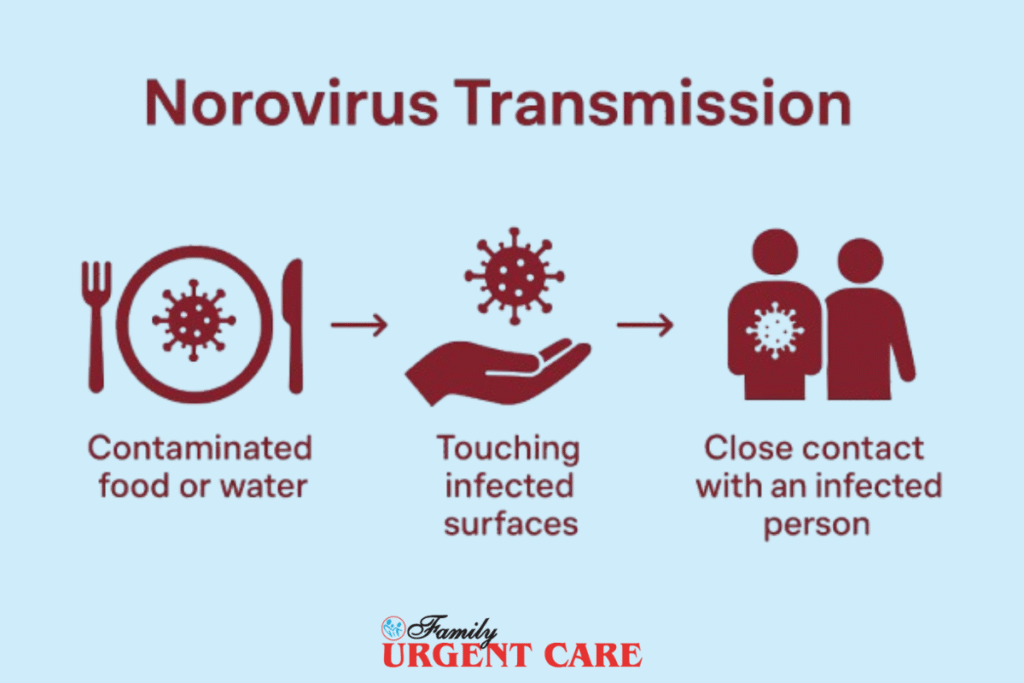Get Expert Treatment For Norovirus at Family Urgent Care
Have you ever experienced sudden nausea, stomach cramps, or vomiting that seems to appear out of nowhere? If so, you might be dealing with Norovirus.
Norovirus is a fast-spreading infection that affects the stomach and intestines, making it one of the leading causes of diarrhea and vomiting worldwide. It spreads easily from person to person, especially in shared spaces (school, hospitals, and nursing homes). Outbreaks are most common during the winter months, typically from November to April.
At Family Urgent Care, we know how challenging it can be to stay hydrated or eat normally when you’re feeling this sick. That’s why our team provides prompt, gentle care to help you prevent dehydration and recover faster.
Common Symptoms You Should Look For
Norovirus can hit suddenly and leave you feeling exhausted. One moment you feel fine, and the next you’re queasy or running to the bathroom. If you notice any of the following signs, visit or contact Urgent Family Care for fast, supportive treatment and relief.
- Nausea
- Vomiting that starts suddenly
- Watery diarrhea
- Stomach cramps or pain
- Low-grade fever
- Headache or body aches
- Feeling tired or weak
How Does Norovirus Spread?

Norovirus can appear when you least expect it. It often passes from person to person through direct contact, touching contaminated surfaces, or consuming contaminated food or water.
Contamination can happen in everyday situations, such as when:
- An infected person prepares food without washing their hands properly.
- Food comes into contact with a counter or surface that has traces of the virus.
- Tiny droplets from someone’s vomit land on nearby food or surfaces.
- Produce or shellfish are grown or harvested from contaminated water sources.
Because norovirus is highly contagious, a single exposure can infect many people, especially in shared environments such as homes, schools, and workplaces.
What makes it tricky is that you can still pass it to others even before you start feeling unwell and for a few days after recovery. Practicing good hand hygiene and avoiding food prep while sick are the best ways to protect yourself and others.
How to Test for Norovirus
Norovirus is often diagnosed based on its common symptoms. These include nausea, vomiting, diarrhea, and stomach cramps. In most cases, testing isn’t necessary because the illness clears up within a few days.
However, if your symptoms are severe, last longer than usual, or occur in a group setting, your doctor may recommend a stool test. This test checks for the virus’s genetic material using a PCR (polymerase chain reaction) method. It is the most accurate way to confirm norovirus infection.
While there’s no specific treatment, testing helps guide proper care, hydration, and steps to prevent the spread of the virus.
How To Prevent Norovirus?
The best way to avoid the infection is to stop the virus from spreading with a few simple habits, like.
- Wash your hands often: Hand hygiene is one of the most effective ways to control outbreaks. Use soap and warm water, especially after using the restroom or before eating and preparing food.
- Clean and disinfect surfaces: Wipe down kitchen counters, door handles, and shared spaces regularly, especially after someone has been sick.
- Handle food safely: Rinse fruits and vegetables well, cook seafood thoroughly, and avoid preparing food if you’re feeling unwell.
- Avoid close contact until full recovery: Give yourself a few days before resuming normal activities to prevent passing the virus to others.
Taking these small steps can significantly reduce your risk of infection and help keep your family healthy
When to See a Doctor
Most cases of Norovirus clear up on their own, but you should contact a doctor if you experience:
- Persistent vomiting or diarrhea
- Signs of dehydration, such as dry mouth, dizziness, or dark urine
- Symptoms lasting more than 2–3 days
- High fever or severe stomach pain
- Blood in vomit or stool
- Infection in infants, older adults, or those with weakened immunity
Getting checked on time ensures proper treatment, quicker recovery, and peace of mind.
How Family Urgent Care Treats Norovirus
Most cases of norovirus improve with rest, fluids, and time. But when symptoms become too uncomfortable or dehydration sets in, professional care becomes necessary. At Family Urgent Care, our team focuses on helping you feel better quickly while preventing complications.

We provide:
- IV fluids to restore hydration and energy levels.
- Medications to ease nausea, cramping, or discomfort.
- Evaluation and testing to rule out other possible causes of your symptoms.
- Personalized guidance on recovery and preventing the illness from spreading at home.
Every patient’s situation is different, and we tailor your treatment to meet your body’s specific needs. Our goal is to help you recover comfortably, safely, and as quickly as possible.

